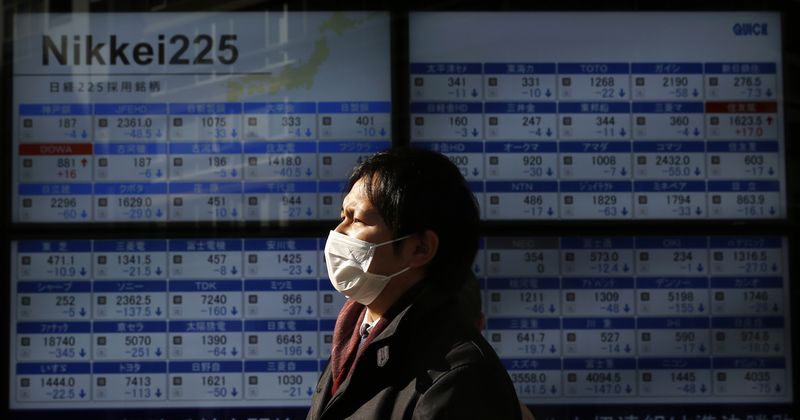* Asian stock markets: https://tmsnrt.rs/2zpUAr4
* US housing, consumer confidence data point to slowing economy
* Investors ponders implications of inverted U.S. yield curve
* Kiwi dollar plunges as central bank opens door to rate cut
By Hideyuki Sano and Tomo Uetake
TOKYO, March 27 (Reuters) - Asian shares slipped on Wednesday, giving up small gains made the previous day as investors tried to come to terms with a sharp shift in U.S. bond markets and the implications for the world's top economy.
MSCI's broadest index of Asia-Pacific shares outside Japan .MIAPJ0000PUS eased 0.1 percent while Japan's Nikkei average .N225 lost 0.6 percent.
Chinese stocks bucked the trend, with the benchmark Shanghai Composite .SSEC rebounding 0.6 percent, the blue-chip CSI 300 .CSI300 climbing 1.1 percent, and Hong Kong's Hang Seng .HSI advancing 0.5 percent.
Wall Street's main indexes tallied solid gains on Tuesday but finished below their session highs in a reflection of the underlying concerns about the economic outlook.
The S&P 500 .SPX gained 0.72 percent while the Nasdaq Composite .IXIC added 0.71 percent. .N
The 10-year U.S. Treasuries yield US10YT=RR inched to as high as 2.432 percent from Monday's 15-month low of 2.377 percent, though the yield curve remained inverted, with three-month bills US3MT=RR yielding 2.461 percent, more than 10-year bonds.
The inversion spooked many investors as this phenomenon has preceded every U.S. recession over the past 50 years, triggering a dramatic selloff in stock markets globally late last week and a stampede into longer-dated U.S. government debt.
"While the markets now got out of the extreme nervousness about the U.S. yield curve, there is no denying that U.S. data has been soft of late, hardly dispelling worries about the outlook," said Hirokazu Kabeya, chief global strategist at Daiwa Securities.
The silver lining for stock bulls is that in the past, it has usually taken many months before the United States slipped into recession after the curve was first inverted.
Yet the signs from a raft of economic data, including a set of indicators on Tuesday, weren't encouraging.
Home building USHST=ECI fell more than expected in February as construction of single-family homes dropped to near a two-year low while the consumer confidence index by the Conference Board USCONC=ECI fell unexpectedly. are entering a new phase in markets as the U.S. monetary policy cycle has come to a turning point, from rate hikes to rate cuts," said Akira Takei, bond fund manager at Asset Management One.
"Not all market participants have changed their mind-set yet. But as time goes by, it will become clear that a rate cut is the real possibility. The curve will be inverted further until the Fed cut rates," he said.
Many major economies in the world, including China, Europe and Japan, are already slowing down, not helped by uncertainties stemming from trade frictions between the U.S. and China as well as Brexit.
A senior International Monetary Fund official said on Tuesday trade tensions between the U.S. and China have caused huge amounts of economic uncertainty and could cut Asia's economic growth by 0.9 percentage point. are left wondering what to expect on Britain's plan to exit from the European Union, with potential scenarios spanning from a cancellation of Brexit to a no-deal exit.
Prime Minister Theresa May will address Conservative Party lawmakers, possibly to set out a timetable for her departure, to win support for her twice-rejected Brexit deal as the parliament prepares to vote on a variety of possible options. of the so-called indicative votes, the pound inched 0.1 percent lower to $1.3185 GBP=D3 .
The euro slipped to a two-week low of $1.1251 EUR= as the dollar gained some footing on a rebound in U.S. bond yields.
The dollar edged back to 110.55 yen JPY= , from Monday's 1-1/2-month low of 109.70.
The New Zealand dollar took a tumble after the country's central bank blindsided markets by saying the next move in interest rates would likely be down, abandoning its long-standing neutral stance.
While the Reserve Bank of New Zealand (RBNZ) kept the official cash rate (OCR) at 1.75 percent as expected, it surprised many by flatly stating "the more likely direction of our next OCR move is down." kiwi dollar NZD=D3 dived 1.6 percent to a two-week low at $0.6797, while bond and bill futures rallied sharply, taking yields to fresh all-time lows.
The Australian dollar AUD=D3 was dragged down in its wake, falling 0.4 percent to $0.7102, though the Aussie did make hefty gains on its kiwi counterpart.
Oil prices remained supported by supply curbs by the Organization of the Petroleum Exporting Countries plus allies and as Venezuela's main oil export port and four crude upgraders have been unable to resume operations following a massive power blackout. crude oil futures LCOc1 rose 0.2 percent to $68.12 per barrel while U.S. crude futures CLc1 edged up 0.1 percent to $60.01.
